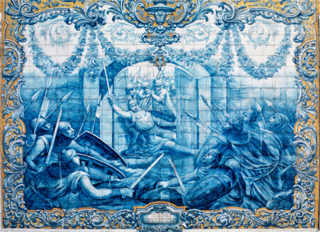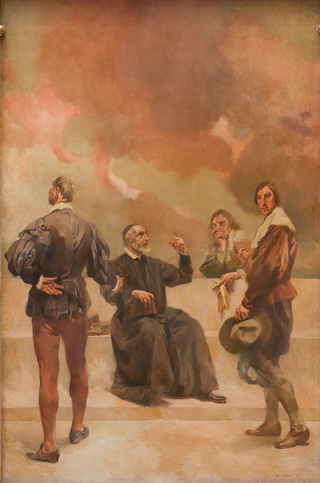
Afonso I, also called Afonso Henriques, nicknamed the Conqueror and the Founder by the Portuguese, was the first king of Portugal. He achieved the independence of the County of Portugal, establishing a new kingdom and doubling its area with the Reconquista, an objective that he pursued until his death.

Afonso IV, called the Brave, was King of Portugal from 1325 until his death in 1357. He was the only legitimate son of King Denis of Portugal and Elizabeth of Aragon.

Manuel I, known as the Fortunate, was King of Portugal from 1495 to 1521. A member of the House of Aviz, Manuel was Duke of Beja and Viseu prior to succeeding his cousin, John II of Portugal, as monarch. Manuel ruled over a period of intensive expansion of the Portuguese Empire owing to the numerous Portuguese discoveries made during his reign. His sponsorship of Vasco da Gama led to the Portuguese discovery of the sea route to India in 1498, resulting in the creation of the Portuguese India Armadas, which guaranteed Portugal's monopoly on the spice trade. Manuel began the Portuguese colonization of the Americas and Portuguese India, and oversaw the establishment of a vast trade empire across Africa and Asia.

Sancho I of Portugal, nicknamed "the Populator", King of Portugal was the second but only surviving legitimate son and fifth child of Afonso I of Portugal by his wife, Maud of Savoy. Sancho succeeded his father and was crowned in Coimbra when he was 31 years old on 9 December 1185. He used the title King of Silves from 1189 until he lost the territory to Almohad control in 1191.
Moniz is a surname in the Portuguese language, namely in Portugal and Brazil. It is believed to derive from a Gothic, or Gascon given names Munnius, Monio, Munino, Monnio, and Munnio used in the Iberian Peninsula in the Middle Ages. It is uncertain whether the Galician and Asturian 'Muñiz' or 'Muniz' surnames are in any way related with Moniz. The Portuguese variants of the medieval name were Munio, Monio and Moninho, making Moniz a patronymic surname. It may refer to:

Martim Moniz was a Portuguese knight of noble birth, and famous figure in the Siege of Lisbon in 1147.
Phoebus of Lusignan was a titular Marshal of Armenia and also titular lord of Sidon, the illegitimate son of Peter of Lusignan, titular Count of Tripoli.
Carlos O'Neill, was the titular head of a branch of the Clanaboy O'Neill dynasty, whose family has been based in Portugal since the 18th century.
Gil Aires was a Portuguese nobleman.
Diogo Gil Moniz was a Portuguese nobleman.
Rui Gil Moniz was a Portuguese nobleman.
Vasco Gil Moniz was a Portuguese nobleman.

FeboMoniz was a Portuguese nobleman who distinguished himself during the 1580 Portuguese succession crisis.
The Camões family were descendants of the 14th-century Portuguese nobleman Vasco Pires de Camões.
Miguel António de Sousa Horta Almeida e Vasconcelos, 2nd Baron of Santa Comba Dão was a Portuguese nobleman.
Jerónimo Moniz was a Portuguese nobleman.
Pedro or Pero Moniz da Silva was a Portuguese nobleman.
Garcia Moniz was a Portuguese nobleman.
João Afonso de Albuquerque,, Juan Alfonso de Alburquerque in Spanish and nicknamed "o do Ataúde", 6th Lord of Alburquerque, was a member of the highest ranks of the nobility of the Kingdom of Portugal, an astute politician, and descendant from the royal houses of both Portugal and Castile, although through illegitimate lines.

The Corte-Real family is a Portuguese noble family dating back to 14th century, originating in Tavira. The family is famous for its involvement in the Portuguese discoveries during the Age of Exploration, in the 16th century. During this time, João Vaz Corte-Real and his sons Gaspar Corte-Real and Miguel Corte-Real notably participated in exploratory voyages to Newfoundland, in Canada.
This page is based on this
Wikipedia article Text is available under the
CC BY-SA 4.0 license; additional terms may apply.
Images, videos and audio are available under their respective licenses.






